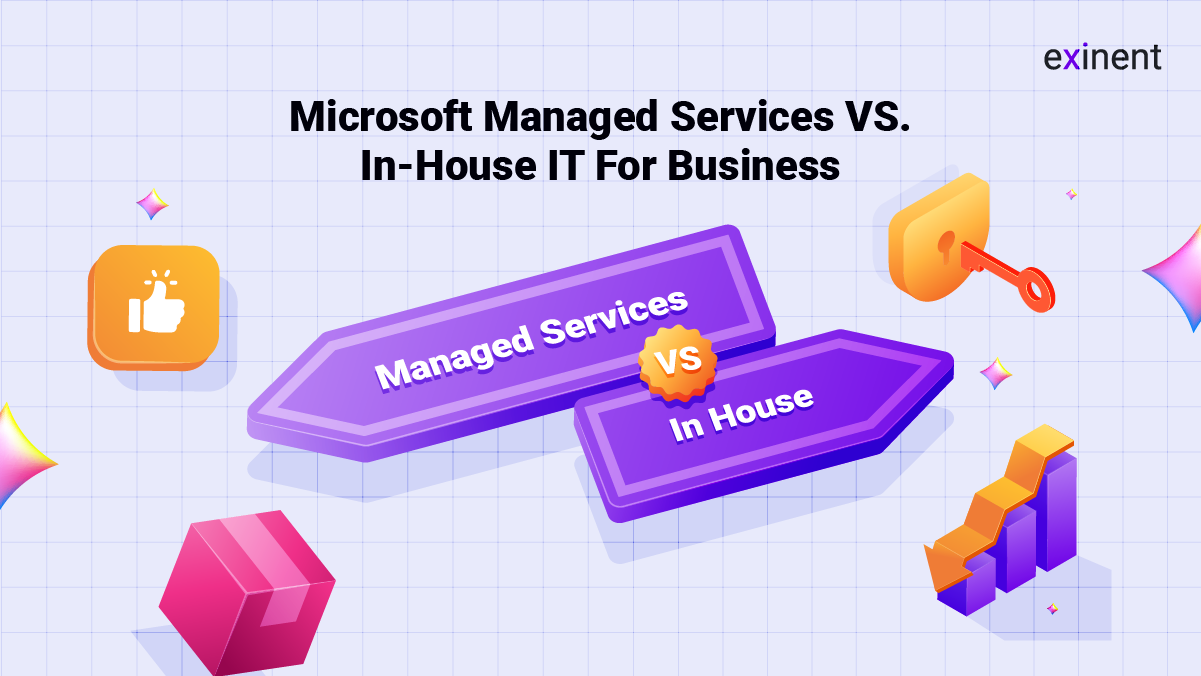
With technological advancement comes a greater need for robust IT infrastructure to support business growth and ensure seamless operations. However, one of the biggest decisions for any business owner or IT leader is choosing between Microsoft Managed Services and in-house IT. Both options have their advantages, but deciding which is right for your business depends on a variety of factors, including budget, scalability, and security needs.
In this guide, we will explore the key differences between Microsoft Managed Services and in-house IT, along with the benefits and potential challenges of each approach. By the end, you’ll have a clear understanding of which option aligns best with your company’s objectives and how each solution can contribute to long-term success.
1. Cost Considerations
When it comes to IT infrastructure, cost is a primary consideration. For many businesses, choosing between Microsoft Managed Services and in-house IT comes down to budget constraints and resource allocation.
- Microsoft Managed Services: Managed services operate on a predictable monthly subscription model. This allows businesses to budget with certainty and eliminates unexpected costs associated with hardware upgrades, system breakdowns, or emergency fixes. Additionally, managed services can reduce the need for significant upfront investment in IT infrastructure, as the provider handles most of the necessary technology and tools.
- In-House IT: Building an in-house IT team requires a substantial upfront investment. Expenses include hiring skilled staff, purchasing hardware and software, and managing ongoing maintenance costs. Unexpected expenses may arise due to system breakdowns or the need for additional resources, which can strain a budget.
Managed services offer a scalable and cost-effective solution for businesses that want to avoid large capital expenditures and unpredictable costs. However, companies that prefer complete control over their IT infrastructure may opt for an in-house team, despite the higher expenses.
2. Scalability and Flexibility
As businesses grow, their IT needs become more complex. Scalability is essential to ensure that the IT infrastructure can accommodate future expansion and increasing demands.
Microsoft Managed Services: Managed services provide unmatched scalability. Whether your business is adding new users, expanding to new locations, or upgrading its technology stack, managed services providers (MSPs) can quickly adjust resources to meet your needs. With a managed services provider, there’s no need to worry about adding new infrastructure or hiring additional staff.
In-House IT: Scaling in-house IT requires hiring additional personnel, purchasing more equipment, and ensuring current systems can support new demands. This can be a time-consuming and costly process, particularly for small- and medium-sized businesses. While an in-house team can provide tailored support, scaling quickly can strain resources.
For companies with high growth potential or fluctuating IT demands, Microsoft Managed Services offer the flexibility to scale up or down as needed without significant investment or logistical challenges.
3. Access to Expertise
The expertise provided by Microsoft Managed Services and in-house IT teams can vary significantly. Having access to specialized skills is essential for staying ahead in a competitive market and addressing complex IT challenges.
- Microsoft Managed Services: Partnering with a Microsoft MSP gives businesses access to a team of IT professionals with specialized knowledge and industry-leading skills. MSPs invest in continuous training and certifications to keep their staff updated with the latest technologies, trends, and cybersecurity practices. This access to diverse expertise is invaluable, especially for smaller companies that may not have the budget to hire IT specialists in every area.
- In-House IT: While in-house IT teams can be highly skilled, their expertise is typically limited to the resources and training provided by the organization. Many businesses find it challenging to keep their in-house teams up to date with emerging technology and industry best practices. Additionally, retaining skilled IT staff can be challenging in a competitive job market, potentially leading to skill gaps.
Managed services provide access to a broader range of skills and ensure that your business is supported by IT experts who stay current with the latest Microsoft technologies and solutions.
4. Security and Compliance
Maintaining a high level of security and ensuring compliance with industry standards and regulations are critical for businesses in today’s digital age. Choosing the right IT support model can play a significant role in securing sensitive data and meeting regulatory requirements.
- Microsoft Managed Services: Managed services providers typically prioritize security as a core component of their offerings. MSPs use advanced threat detection and prevention tools, continuous monitoring, and regular security assessments to keep systems secure. Additionally, MSPs often provide compliance support, helping businesses adhere to regulations such as GDPR, HIPAA, and ISO standards.
- In-House IT: Security and compliance management within an in-house team can vary based on resources, expertise, and budget. While some larger organizations have dedicated cybersecurity professionals, smaller businesses may struggle to allocate the necessary resources for continuous monitoring, threat detection, and compliance. In-house teams may lack the advanced tools and expertise provided by MSPs, potentially leaving vulnerabilities unaddressed.
For businesses prioritizing security and compliance, Microsoft Managed Services offer a more comprehensive and reliable approach to safeguarding data and adhering to industry standards.
5. Support and Reliability
Reliable IT support is crucial for maintaining productivity and minimizing downtime. Whether it’s troubleshooting issues or ensuring system stability, having dependable support can significantly impact business operations.
- Microsoft Managed Services: MSPs offer 24/7 support and proactive monitoring to identify and address issues before they disrupt operations. With around-the-clock support, businesses can rely on managed services for immediate assistance, ensuring minimal downtime and maximum productivity.
- In-House IT: In-house teams generally provide support during regular business hours. While an in-house team may respond quickly during office hours, issues arising outside of business hours may not be addressed until the next workday. Additionally, smaller in-house teams may face resource constraints during high-demand periods.
Managed services ensure that your IT infrastructure is monitored and maintained consistently, providing a higher level of reliability and availability.
Deciding Between Microsoft Managed Services and In-House IT
When choosing between Microsoft Managed Services and in-house IT, consider your business’s unique needs, goals, and resources. Here are some questions to help guide your decision:
- Budget and Cost: Does your business prefer predictable monthly expenses, or is it prepared to invest heavily upfront for complete control over IT infrastructure?
- Growth Potential: Is your business expected to grow rapidly, or does it require the flexibility to scale up and down?
- Security Requirements: Does your business require advanced security measures and ongoing compliance support?
- Skill Requirements: Are you looking for access to specialized IT expertise without hiring full-time staff?
- Availability and Support Needs: Does your business require 24/7 IT support, or is regular business-hour support sufficient?
If your business values flexibility, advanced security, and access to diverse IT expertise, Microsoft Managed Services may be the best choice. For businesses that prioritize complete control and prefer in-house operations, building a dedicated IT team could be the better option.
Conclusion
Choosing the right IT infrastructure model is crucial for supporting business growth, security, and operational efficiency. Both Microsoft Managed Services and in-house IT have their benefits, and the best choice depends on your unique needs. However, for businesses looking to leverage Microsoft’s cutting-edge tools, enhance scalability, and access specialized skills, managed services provide a compelling and cost-effective solution.
Empower your business with Exinent’s Microsoft 365 Managed Services. Our experts provide comprehensive IT solutions tailored to your unique needs, ensuring a secure, scalable, and reliable IT environment. Contact Exinent today to discuss how our managed services can support your business’s growth and security goals.
